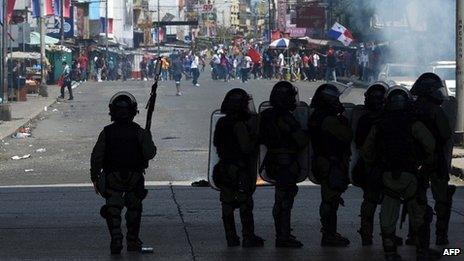Colon Free Zone: Panama debates land sale law repeal
- Published

Panama's National Assembly has taken the first step towards repealing a controversial law allowing the sale of land in Colon Free Zone, Latin America's biggest duty-free zone.
The assembly debated the law on Friday and is expected to hold a final vote on its repeal on Sunday.
The decision to abandon government plans to sell the land in the city of Colon follows a week of protests.
At least three people have died, including a nine-year-old boy.
On Friday, dozens of looters ransacked shops, smashed store windows and stoned vehicles in Panama City after protesting outside the assembly.
The police clashed with protesters in Colon too.
'Little acceptance'
President Martinelli, who was returning home from a trip to Asia on Friday, tweeted that the controversial law would be repealed in its entirety.
"The law sought the best for Colon but it had little acceptance", he wrote. "We will proceed with its definitive repeal."
The government had said the privatisation would boost development in Colon, but trade unions and residents argued it would cost jobs and push down wages.
Opponents of the law included trade unions, members of the Colon Chamber of Commerce and a variety of civil society groups.
The protests flared in Panama soon after president Martinelli signed the controversial law on 19 October.
Four days later he announced the government would scrap its plans to sell the land to private investors.
Mr Martinelli tweeted: "If the people of Colon don't want the sale of lands in the free trade zone, the sale will be repealed."
The president said instead that commercial rents would be increased and the money reinvested in the region, as protesters had been demanding.
The Colon region is the biggest duty-free zone in Latin America but is blighted by poverty and crime.
Panama's economy has boomed in recent years, but sections of the population remain excluded from its commercial success.
The city of Colon - one of the largest free trade ports in the world and in operation since the 1950s - sits at the end of the Panama Canal on the Caribbean, just outside the former Panama Canal Zone.
The canal, linking the Atlantic Ocean to the Pacific, is Panama's main source of revenue.
- Published24 October 2012
- Published20 October 2012
- Published22 January 2012
- Published18 January 2012